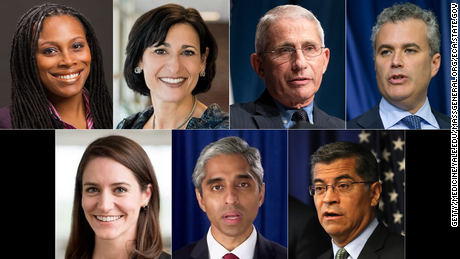US sees its deadliest Covid-19 week since April, with more than 15,600 deaths
And for the sixth day in a row, more than 100,000 people are being treated for the virus in hospitals across the country.
“We probably are just going to start seeing the brunt of what it means when you have people traveling and congregating in seemingly innocent settings,” Fauci told CNN Monday. “The situation is that as we enter now from the Thanksgiving holiday season into the Christmas holiday season, it’s going to be challenging.”
Despite challenges to production and distribution, tens of millions of Americans will be vaccinated by January 20, Health and Human Services Secretary Alex Azar said in an interview with Axios that aired Monday.
‘If the worst happens, hospitals will not be able to treat’ patients
As the impacts of the virus move through the US, state leaders are managing the strain on their hospital systems.
As of Friday, hospitals in Massachusetts will curtail elective procedures to free up staffing and beds for spiking coronavirus cases, Gov. Charles Baker said Monday.
“You could actually see our positive test rates stop growing” before the holiday, he said. “And after about five to 10 days, which is the typical incubation period after Thanksgiving, they took off like a rocket.”
Pennsylvania is also in an increasingly “dire” situation when it comes to hospital beds, Gov. Tom Wolf said Monday. Pennsylvania Secretary of Health Dr. Rachel Levine said patients are already being diverted to other facilities due to full emergency rooms.
“If the worst happens, hospitals will not be able to treat all sick Pennsylvanians,” Wolf said. “They’ll be forced to turn away people who need treatment, and that means more Pennsylvanians will die.”
Meanwhile in Kentucky, Gov. Andy Beshear announced that he does not plan to extend the in-person dining restrictions for bars and restaurants set to expire December 13, meaning the following day they will return to 50% capacity.
The governor added that when restaurants and bars return to indoor service, they will need to be “militant” about mask mandates.
Recruiting to vaccinate over the holidays
Officials hope to distribute the first wave of vaccines, which were advised to go to the elderly and health care workers this month, and though the vaccine candidates have not yet been approved, efforts are underway to swiftly distribute and administer them.
Mount Sinai Hospital System in New York has begun recruiting people to vaccinate its health care workers over the holiday season, Susan Mashni, vice president and chief pharmacy officer for Mont Sinai health system, told CNN. In addition to nurses, pharmacists and those who are currently administering flu vaccines, they are reaching out to pharmacy and nursing interns, as well as medical students and residents.
The system is planning to administer Pfizer’s vaccine in “pods,” using makeshift walls and bays in hospital lobbies, and to stagger the immunizations among employees in anticipation that they will feel side effects.
It is still unclear whether those who have already had Covid-19 and have antibodies should be among the people to receive a vaccine, Azar said Monday.
“That’s something that the FDA has not ruled on and CDC (Centers for Disease Control and Prevention) has not ruled on, yet, in terms of providing guidance,” Azar said during an interview with NBC.
Holidays could lead to a ‘really dark time’
“The problem is, that’s going to come right up to the beginning of the Christmas, Hanukkah potential surge,” he said.
If Americans travel and spread the virus over the upcoming holiday, “the middle of January could be a really dark time for us,” Fauci said.
“It’s such a natural thing to think, when I have family and friends over for the holidays, Christmas and Hanukkah, you get indoors you take your mask off because you’re eating and drinking. And you don’t realize that there may be somebody that you know, that you love, that’s a friend, that’s a family member, who is perfectly well with no symptoms, and yet they got infected in the community, and brought it into that small gathering that you’re now having in your home,” he said.
CNN’s Brandon Miller, Rebekah Riess, Lauren Mascarenhas, Laurie Urie, Shelby Erdman, Naomi Thomas and Steve Almasy contributed to this report.
![]()








